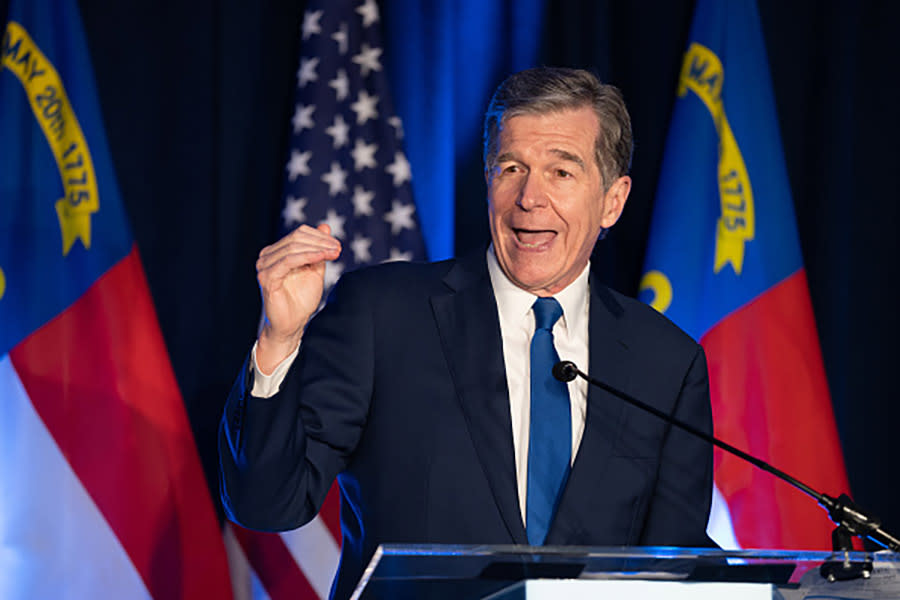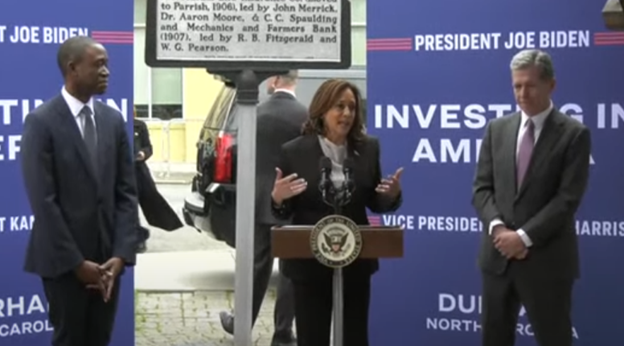North Carolina’s Gov. Roy Cooper fielding questions about a spot on the national Democratic ticket

- Oops!Something went wrong.Please try again later.
- Oops!Something went wrong.Please try again later.
North Carolina Governor Roy Cooper has warmed up the crowds at numerous Biden-Harris campaign events this year. (Photo by Sean Rayford/Getty Images)
Gov. Roy Cooper’s job firing up crowds for the Democratic presidential ticket this year would appear to be at odds with the subdued demeanor of a longtime North Carolina office holder not given to verbal flourishes.
He got audiences going in a call-and-response, with the crowd shouting “No” when Cooper asked if they wanted a second Donald Trump term.
Cooper’s measured responses to questions Monday morning on whether he would consider becoming Vice President Kamala Harris’ running mate now that President Joe Biden has dropped out of the race was the Cooper that North Carolinians are much more used to hearing.
“I appreciate people talking about me, but I think the focus right now needs to be on her this week,” Cooper said on MSNBC’s Morning Joe. “She needs to concentrate on making sure that she secures this nomination and gets this campaign ready to go.”
After Biden bowed out on Sunday, Cooper thanked Biden, calling him “among our nation’s finest presidents,” on X, formerly Twitter, and endorsed Harris.
Cooper, 67, is serving his second term as governor and cannot run for a third. Even before Biden announced Sunday he was leaving the race, there was speculation about a role for Cooper in the second term of a Biden administration.
Cooper’s steady climb through North Carolina’s political ranks and his position as a Democratic governor in a swing state has pundits measuring his potential as Harris’ running mate. US Sen. Mark Kelly of Arizona, Pennsylvania Gov. Josh Shapiro, and Kentucky Gov. Andy Beshear are also mentioned as potential vice presidential candidates who could join Harris on the ticket.
Keeping healthcare and public schools in the forefront
Introducing Biden and Harris at North Carolina rallies gave Cooper a chance to tout Medicaid expansion in North Carolina, a premier accomplishment of his administration. He announced at a news conference this month that more than 500,000 residents had enrolled in the expanded program. At campaign rallies, he paints the image of Trump ripping a health insurance card out of someone’s hand.
Cooper started fighting for Medicaid expansion even before he officially took office after defeating one-term Republican Pat McCrory in 2016. Leading Republicans in the legislature dismissed all calls for Medicaid expansion for years. Cooper kept health care and Medicaid expansion at the forefront, even though the state was not able to offer more people health insurance under Medicaid expansion without the GOP-controlled legislature’s approval.
Republicans reconsidered after the American Rescue Plan Biden signed in 2021 included financial incentives for states that had not yet expanded Medicaid under the Affordable Care Act.
Republicans put Medicaid expansion in the budget they passed last year. Cooper allowed the budget to become law without his signature because it included Medicaid expansion — even though it was stuffed with items he did not want such as an expansion of private school vouchers.
Cooper has repeatedly denounced private school vouchers and built his education agenda on increasing spending on public education and teacher raises. But his tenure as governor in large part has been shaped by issues involving health, health insurance, and disputes with Republicans in the legislature over policy priorities.
Tested by the COVID pandemic
The 2020 campaign for governor revolved largely around his responses to the COVID-19 pandemic. Cooper clashed with Republican legislators over health-related business closures and the duration of public school closures.
Republican Lt. Gov. Dan Forest challenged Cooper with a campaign that leaned heavily on lifting COVID restrictions and opening public schools. Forest sued over some of Cooper’s COVID executive orders, but was shut down in court. Forest went on to lose the governor’s race to Cooper by more than four percentage points.
Bar owners had more success challenging Cooper’s COVID rules. They sued over Cooper’s decision to keep bars closed while allowing restaurants to open with capacity limits a few months into the pandemic. The state Court of Appeals ruled last April that Cooper had violated bar owners’ rights.
Nationally, North Carolina’s handling of the pandemic was praised by the Biden administration. Biden appointed Dr. Mandy Cohen, who was Cooper’s first Health and Human Services secretary, director of the Centers for Disease Control and Prevention.
A weak office needed a negotiator
The governor’s office in North Carolina was designed to be weak. North Carolina governors don’t have a line-item veto and cannot veto redistricting bills.
Republicans have controlled the legislature for Cooper’s entire tenure as governor. In the years Republicans did not have supermajorities in the House and Senate — and were not able to override his vetoes — Cooper was able to push for negotiations on issues and stifle bills he opposed.
Convincing Democrats to uphold his vetoes meant Cooper “was able to participate in the discussion,” said state Senate Democratic leader Dan Blue of Raleigh.
Cooper had “a profound impact on where the state was going,” Blue said. “He moderated the Republicans’ hardline positions on multiple occasions.”
Cooper’s supporters note that he has never lost a race from the time he won a House seat in 1986 after beating a 12-term Democratic incumbent. Cooper repeatedly won statewide office while Democratic presidential candidates most often fell short. The last Democratic presidential candidate to win North Carolina was Barack Obama in 2008.
Cooper grew up on a tobacco farm in Nash County. His mother was a teacher and his father a lawyer.
He attended UNC Chapel Hill on a Morehead Scholarship and received his law degree from UNC.
He is a devoted fan of the UNC Tar Heels and Carolina Hurricanes NHL team.
A Charlotte Observer article from 1988 described Cooper as a “star of the legislative basketball team” who kept a low profile in his first term.
“I would like to serve between three and five terms in the legislature,” the article quotes Cooper saying. “During that time I would have been able to make an impact and accomplish things I want to accomplish.
“And 15 years from now I think I could look to some other office or make a living practicing law.”
After a stint in the state House, Cooper was appointed to a Senate seat in 1991, where he rose to become the chamber’s Majority Leader.
He won the first of four successful races for state Attorney General in 2000.
He rejected calls to run for governor in 2008, and resisted a push for him to challenge incumbent Republican U.S. Sen. Elizabeth Dole that year.
North Carolina Democrats are wondering whether Cooper’s career ladder leads to the vice presidency.
After they voted to endorse Harris for president on Sunday, state party chair Anderson Clayton reported that North Carolina delegates to the Democratic National Convention “are enthusiastically supportive of Gov. Cooper becoming the nominee for our vice president as well.”
The post North Carolina’s Gov. Roy Cooper fielding questions about a spot on the national Democratic ticket appeared first on NC Newsline.


